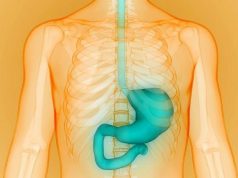Digestive Disease Week 2023
By Beth Gilbert HealthDay Reporter
Digestive Disease Week, the annual meeting sponsored by the American Association for the Study of Liver Diseases, American Gastroenterological Association, American Society for Gastrointestinal Endoscopy, and Society for Surgery of the Alimentary Tract, was held from May 6 to 9 in Chicago and attracted more than 10,000 participants from around the world, including researchers and academics in the fields of gastroenterology, hepatology, endoscopy, and gastrointestinal surgery.
In one study, Amir Zarinnpar, M.D., Ph.D., of the University of California in San Diego, and colleagues found that the gut microbiome, the collection of bacteria, viruses, and fungi living inside the digestive system, follows daily and seasonal rhythms.
The authors analyzed a large number of stool samples from individuals around the world and found that more than half of the different bacteria types change throughout the day. Seasonal patterns were also observed, similar to how the tides ebb and flow. The researchers also found that fluctuations in the gut microbiome can impact an individual’s health and make it challenging to define a normal gut microbiome.
“By understanding these daily and seasonal patterns, we, as researchers and doctors, can take them into account when interpreting study results or developing treatments related to the gut microbiome,” Zarinnpar said. “This knowledge can help improve the accuracy of research findings and the effectiveness of treatments related to the gut microbiome.”
In another study, Vibhu Chittajallu, M.D., of the Case Western Reserve University and University Hospitals in Cleveland, and colleagues found that bariatric surgery has a protective effect against the development of cancer among individuals with obesity.
The authors evaluated the protective effect of bariatric surgery against the development of obesity-associated cancers. In a retrospective analysis, the records of more than 55,000 patients from 47 U.S. health care organizations with obesity (body mass index, >35 kg/m²) who underwent bariatric surgery were evaluated and compared to those of patients with obesity who did not undergo the surgery. During a 10-year follow-up period, the researchers observed a greater than 50 percent lower rate of obesity-associated cancers occurring in adult patients with obesity who underwent bariatric surgery when compared with similar patients who did not undergo the surgery. The investigators noted lower incidence proportions of breast, colon, liver, ovarian, and endometrial cancers in the bariatric surgery group.
“Cancer is one of the leading causes of premature and preventable deaths in adult patients with obesity, yet only approximately 1 percent of patients eligible for bariatric surgery undergo it,” Chittajallu said. “There is growing evidence that bariatric surgery plays a protective role against the development of obesity-associated cancers and continued efforts are needed to further understand the specific mechanisms of weight loss and decreased cancer formation. These data further reaffirm the multitude of benefits incurred by providing bariatric surgery to patients with obesity.”
As part of the EMINENT study, Celine Busch, M.D., of the Amsterdam University Medical Center, and colleagues found that recellularization via electroporation therapy (ReCET) in combination with a glucagon-like peptide-1 receptor agonist (semaglutide) led to the elimination of insulin therapy in 86 percent of patients.
In this pilot study, the authors performed the ReCET procedure among 14 patients with type 2 diabetes who were using long-acting basal insulin, followed by two weeks of treatment with semaglutide. The researchers showed that ReCET was feasible and safe when combined with semaglutide. Specifically, 86 percent of patients remained off exogenous insulin at both six and 12 months, while having better regulated type 2 diabetes and better metabolic health.
“Despite the fact that patients were off insulin therapy, they had better regulation of their blood glucose and a better metabolic health at both six- and 12-month follow-ups,” Busch said. “At this point we need more research to find the mechanism of action and show the efficacy of ReCET. Once the efficacy is confirmed in larger controlled trials, this treatment can change the way we treat type 2 diabetes in the future.”
In a proof-of-concept study, Jason Tye-Din, Ph.D., of the Royal Melbourne Hospital and Walter and Eliza Hall Institute of Medical Research in Australia, and colleagues found that DONQ52, a custom-designed antibody that targets the gluten peptides known to cause celiac disease and blocks them from activating the disease-causing T cells, can strongly block wheat gluten peptides and reduce the activation of disease-causing gluten-specific T cells.
The authors assessed how well DONQ52 blocks gluten peptides that cause celiac disease by performing a gluten challenge in which 15 individuals with celiac disease were fed gluten in the form of food containing wheat, barley, or rye. The investigators collected blood samples after this gluten challenge to collect gluten-specific T cells, and then tested these gluten-specific T cells mixed with gluten peptides either with or without DONQ52. The researchers found that DONQ52 could effectively block gluten peptide responses, especially after wheat consumption. DONQ52 blocked 80 to 100 percent of responses to a potent mixture of the most dominant gluten peptides among individuals with celiac disease.
“Although rye and barley are less commonly consumed in the Western diet, and most therapies are not tested against rye or barley, we showed that DONQ52 can also reduce responses to a cocktail of the dominant disease-causing rye and barley peptides by approximately half (range, 40 to 80 percent),” Tye-Din said. “Importantly, DONQ52 did not block other peptides like in tetanus protein and did not activate T cells.”
DDW: Antibiotic Exposure, Diet Increase Risk for Pediatric IBD
TUESDAY, May 16, 2023 (HealthDay News) — Factors associated with the risk for pediatric inflammatory bowel disease include exposure to antibiotics during early childhood and a Western diet, according to research presented at the 2023 Digestive Disease Week, held from May 6 to 9 in Chicago.
Read Full Text
DDW: Endoscopic Procedure May Eliminate Insulin Use in T2DM
TUESDAY, May 2, 2023 (HealthDay News) — Recellularization via electroporation therapy combined with glucagon-like peptide-1 receptor agonist treatment is safe and feasible for type 2 diabetes and can eliminate the use of insulin therapy, according to a study presented at the 2023 Digestive Disease Week, held from May 6 to 9 in Chicago.
Read Full Text
DDW: Lower Risk for Obesity-Linked Cancer Seen With Bariatric Surgery
MONDAY, May 1, 2023 (HealthDay News) — Bariatric surgery is associated with a reduction in the risk for obesity-associated cancers, according to a study to be presented at the 2023 Digestive Disease Week, being held from May 6 to 9 in Chicago.
Read Full Text
Copyright © 2023 HealthDay. All rights reserved.








